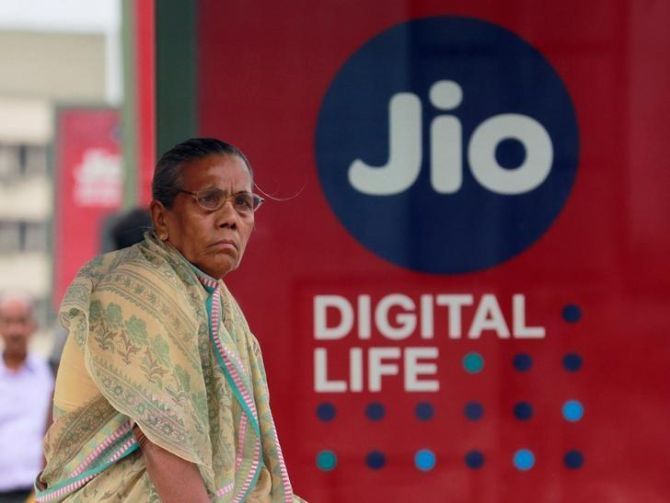Jio's revenue increase was phenomenal in many circles: In Haryana, the RMS gain was 13 percentage points; in Bihar, 20 percentage points; in Odisha, 15 percentage points; and in Assam, 11 percentage points.
However, incumbent telcos said this increase was only in three quarters, and it happened because of an order by the Telecom Regulatory Authority of India, which tweaked the definition of significant market player (SMP) for predatory pricing.

Reliance Jio's overall revenue market share (RMS) went up from 19.8 per cent in the fourth quarter (Q4) of 2017-18 (FY18) to 26.1 per cent in Q2FY19, mostly at the expense of incumbent operators.
In the same period, Jio crossed the 30 per cent RMS mark in 15 out of 19 circles (excluding metros).
In Q4FY18, its share was only in nice circles.
The increase was phenomenal in many circles: In Haryana, the RMS gain was 13 percentage points; in Bihar, 20 percentage points; in Odisha, 15 percentage points; and in Assam, 11 percentage points.
Incumbent telcos said this increase was only in three quarters, and it happened because of an order by the Telecom Regulatory Authority of India, which tweaked the definition of significant market player (SMP) for predatory pricing.
Under the new definition of the SMP, the regulator did not allow predatory pricing by telcos which had more than 30 per cent subscriber or revenue market share.
This, incumbents alleged, permitted only Jio, which had a lower market share.
It also did not allow telcos offer segmented tariffs for consumers (customised for a person), which was common for postpaid customers earlier.
The telcos challenged the order in Telecom Disputes Settlement and Appellate Tribunal, which, apart from setting aside the order, observed it is non-transparent.
Incumbent operators said the order gave Jio a big lead and they played the pricing game to gain market share.
"The order has come too late when they have already achieved their objective of reaching 30 per cent in most circles in the country.
"How will we be compensated for this loss of business," says a senior executive of a telecom company.
They also point out that the order not allowing segmented tariffs adversely impacted them as they have bulk of the postpaid customers where such tariffs were common.
Jio on the other hand does not have much postpaid customers.
Incumbent operators say that while post-paid constitutes for only 2 per cent of the subscriber base, they constitute for 20 per cent of the revenues and this had a major impact on their revenues.
Sources close to Jio however say that the tariff order had no major impact on them.
The increase in subscriber base and revenue market share that Jio was able to garner was due to its USP- the launch of its 4G feature phone (which is effectively free to the customers) in a big way in May.
"While at an average we making net adds in the last four to five months between 10 to 12 million customers, half of them were on our own feature phones.
We getting 2G subscribers to move to 4G at a very low cost while competitors had no similar offering" says a source close to the company.










